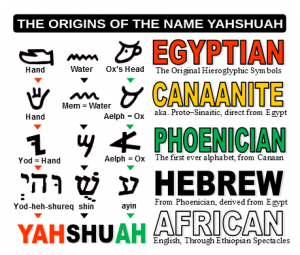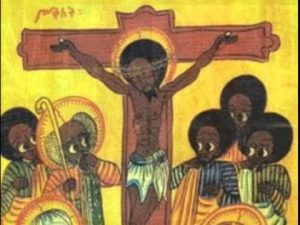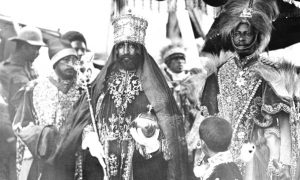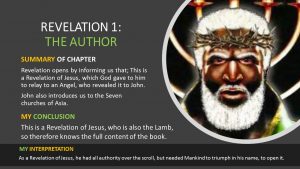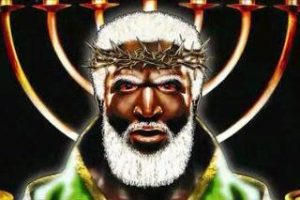The Temple of Yahshuah Triple-fold Law
4 years ago Imani YahshuahHere, we subscribe to a Threefold or Triple-fold Law.
These are three divinely inspired historical human Laws that have guided human societies and individuals spiritual growth over the past 6000 years and more. Two of these laws can be found in the Holy Bible, one in the Old Testament, the 10 Commandments, and the Completed Law, in the New Testament, found within the Gospel (Words) of Yahshuah. However, the 3rd law pre-dates the Holy Bible by many thousands of years and is in fact the oldest known written code of laws to humankind, which comes from the Ancient Egypt (Mizraim / Kemet) and is known to history as the Law of Ma'at.
Together these 3 laws, provide the foundation upon which to build a Temple of Yahshuah (God's Salvation), within yourself. However, it should be noted and fully understood that each law, in its own right and independently of each other, was and is sufficient if practiced and adhered to sincerely and wholeheartedly, to guide any individual to become Spiritually Enlightened and reconnect to One Universal Divine Intelligence, otherwise known as God.
As mentioned all these 3 Laws are accepted and subscribed to, within the Temple of Yahshuah. Nevertheless The Law of Ma'at and the 10 Commandments, are used as detailed points, to help us adhere to and follow more strictly, the Gospel Law given to us by Yahshuah Himself, which represents the fullness and culmination of the two laws it proceeds.
The Triple-Fold Law, narrated by M.E = Mitochondrial Eve. Digitally
The Law of Yahshuah
The Fulfilment of the Law, dating from 30 AD, to present
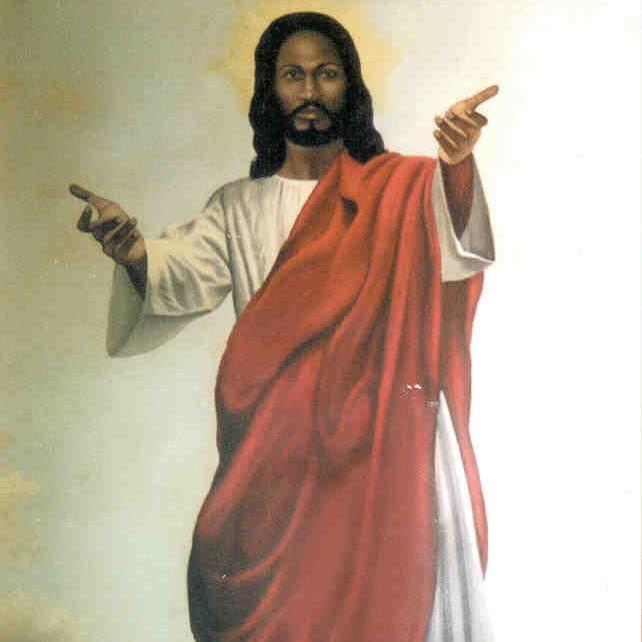
A Note About The Law of Yahshuah
The Law of Yahshuah, culminates to a specific reference in the Bible found at John 13:34, when Yahshuah offers a new commandment for his followers, which is "to love each other" as he had loved them. However, Yahshuah also assures us when asked which is the greatest (Mat 22:36-40) or the first (Mar 12:28-31) of the Ten Commandments given to Moses, that his new commandment, was not actually new, but was also embedded within these Ten Sacred Laws. This therefore means that although used here as a separate, individual and specific Law, in its own right, this Law is actually only a summary of those Ten Commandments, which help us to better understand the fundamental foundations upon-which these Ten Commandments are built. The Law of Yahshuah, therefore is not a New Law, but is provided, as he had stated himself, to in fulfilment of it (Mat 5:17) and to help us as individuals fulfil the Law.
The Law of Yahshuah
"A new commandment
I give unto you,
That ye love one another;
as I have loved you,
that ye also love one another".
John 13:34
Provided in fulfilment of the Ten Commandments,
"Think not that I am come
to destroy the law,
or the prophets:
I am not come to destroy,
but to fulfil".
Mat 5:17
To help us to fulfil these Laws, as individuals.
And Jesus answered him,
"The first of all the commandments is,
Hear, O Israel; The Lord our God is one Lord:
And thou shalt love the Lord thy God with all thy heart,
and with all thy soul, and with all thy mind,
and with all thy strength: this is the first commandment.
And the second is like, namely this,
Thou shalt love thy neighbour as thyself.
There is none other commandment greater than these."
Mar 12:29 -31
The 10 Commandments
The Law of Moses, dating from around 1400 BC to present
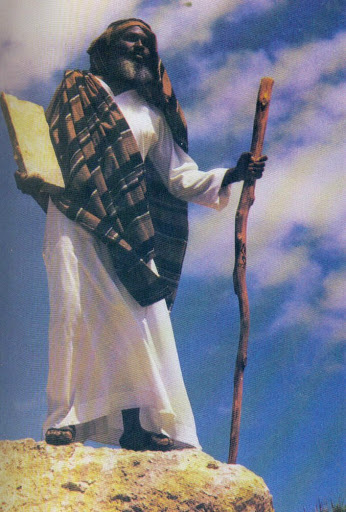
A Note About The Commandments
The importance of these 10 Commandments, to the Bible narrative can not be overstated, particularly to those Israelites, now downtrodden, as predicted, who have forsaken them. However of even greater significance is the relevance and relation that these 10 Commandments have with the law, which proceeded it, the Law of Ma'at. This Law was also the Law that these Israelites themselves, had been subject to, for 400 years, whilst living in Egypt, prior to Moses birth. Notwithstanding, also that Moses himself, would have been very familiar with this more ancient law, namely the Law of Ma'at, growing up as a prince in Egypt. On further examination and when compared with the Law of Ma'at, it can also be seen quite easily that the Ten Commandments, are but an updated version of the Law of Ma'at, with a central objective, confirmed by the 1st commandment, to turn these Israelite people solely, to the worship of the One Supreme God, without any intercessor or image.
The Ten Commandments
Exo 20:1 -17 And God spake all these words, saying, I am the LORD thy God, which have brought thee out of the land of Egypt, out of the house of bondage.
(1)
Exo 20:3 Thou shalt have no other gods before me.
(2)
Exo 20:4 Thou shalt not make unto thee any graven image, or any likeness of any thing that is in heaven above, or that is in the earth beneath, or that is in the water under the earth:
Exo 20:5 Thou shalt not bow down thyself to them, nor serve them: for I the LORD thy God am a jealous God, visiting the iniquity of the fathers upon the children unto the third and fourth generation of them that hate me;
Exo 20:6 And shewing mercy unto thousands of them that love me, and keep my commandments.
(3)
Exo 20:7 Thou shalt not take the name of the LORD thy God in vain; for the LORD will not hold him guiltless that taketh his name in vain.
(4)
Exo 20:8 Remember the sabbath day, to keep it holy.
Exo 20:9 Six days shalt thou labour, and do all thy work:
Exo 20:10 But the seventh day is the sabbath of the LORD thy God: in it thou shalt not do any work, thou, nor thy son, nor thy daughter, thy manservant, nor thy maidservant, nor thy cattle, nor thy stranger that is within thy gates:
Exo 20:11 For in six days the LORD made heaven and earth, the sea, and all that in them is, and rested the seventh day: wherefore the LORD blessed the sabbath day, and hallowed it.
(5)
Exo 20:12 Honour thy father and thy mother: that thy days may be long upon the land which the LORD thy God giveth thee.
(6)
Exo 20:13 Thou shalt not kill.
(7)
Exo 20:14 Thou shalt not commit adultery.
(8)
Exo 20:15 Thou shalt not steal.
(9)
Exo 20:16 Thou shalt not bear false witness against thy neighbour.
(10)
Exo 20:17 Thou shalt not covet thy neighbour's house, thou shalt not covet thy neighbour's wife, nor his manservant, nor his maidservant, nor his ox, nor his ass, nor any thing that is thy neighbour's.
The Law of Ma'at
The Declaration of Innocence, from before 4000 BC.
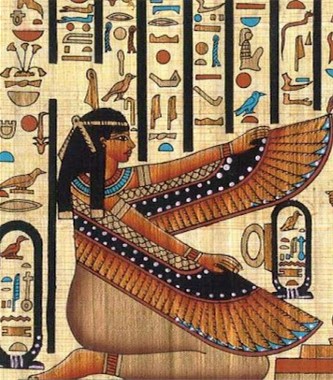
A Note About The Law of Ma'at
The Declaration of Innocence, or The Law of Ma'at, was normally declared by an individual after death. It is therefore obvious that they knew this law in life, whilst living and alive. Within the Temple of Yahshuah, we therefore present these Law's as they would have been subscribed to, by the living, before death. This has been achieved by adding the term "/will not" present and future tense, still alive, instead of simply "I have/not", past tense, after death. In addition to this adaptation, we have also removed any insinuation or acknowledgement to Any Other God than the One God of All Ages Yahovayah, (The Elohim) which would be inconsistent with the religion and faith of the Egyptian themselves.
The 42 Laws of Ma'at
(1) " I have/will not do iniquity."
(2) " I have/will not rob with violence."
(3) " I have/will not steal."
(4) " I have/will commit no murder; I have/will do no harm."
(5) " I have/will not defraud Temple offerings."
(6) " I have/will not diminish my oblations."
(7) " I have/will not plundered or defame God."
(8) " I have/will speak no lies."
(9) " I have/will not snatch away food."
(10) " I have/will not cause pain."
(11) " I have/will not commit fornication."
(12) " I have/will not cause the shedding of tears."
(13) " I have/will not deal deceitfully."
(14) " I have/will not transgress."
(15) " I have/will not act guilefully."
(16) " I have/will not lay waste the ploughed land."
(17) " I have/will not be an eavesdropper."
(18) " I have/will not set my lips in motion [against any one]."
(19) " I have/will not be angry/wrathful except for a just cause."
(20) " I have/will not defile the wife of any man." (repeated below)
(21) " I have/will not defile the husband of any women."
(22) " I have/will not polluted myself."
(23) " I have/will not cause terror."
(24) " I have/will not transgress."
(25) " I have/will not burn with rage."
(26) " I have/will not stop my ears against words of Right &Truth."
(27) " I have/will not work grief"
(28) " I have/will not act with insolence."
(29) " I have/will not stirred up strife."
(30) " I have/will not judge hastily."
(31) " I have/will not be an eavesdropper."
(32) " I have/will not multiply words exceedingly."
(33) " I have/will do neither harm nor ill."
(34) " I have/will never curse the king."
(35) " I have/will never foul (poison) the water."
(36) " I have/will not speak scornfully."
(37) " I have/will never curse God."
(38) " I have/will not steal."
(39) " I have/will not defraud the offerings of God."
(40) " I have/will not plunder the offerings of the blessed dead."
(41) " I have/will not filch the food of the infant, neither have/will I sin against the God of my native town (ancestors)."
(42) " I have/will not slaughter with evil intent the animals of God."
Summary of the above Laws
As can be seen here there are much similarities between each of these three laws, each providing us with a different strategy to develop and maintain a righteous life.
The Law of Ma'at in particular goes into great detail, as to what is expected and what type of behaviour equates to righteous conduct. Whilst The 10 Commandments tends to be instructive and advisory, representing the minimum standard that is acceptable; And the Law of Yahshuah, focusses primarily upon focusing the brain, heart body and soul, to best achieve a life of righteousness, upon the LOVE of GOD and FELLOW HUMAN BEINGS.
In addition to these similarities there are also direct parallels, as well as contradictions, particularly between the Law of Ma'at and the Ten commandments.
Whilst they can be interpreted as contradictions, nevertheless in truth, they are but developments of a most ancient tradition that by then had become distorted by the Egyptian's, but was being restored by Moses for the Israelites.
This is evident by the first 2 Commandments that forbids, acknowledgement of any other Deity than the Unseen One God (Elohim), therefore banning all forms of material or physical representations, devotion or evocations, which was the basis upon which the Ancient Egyptian religious system was built.
Outside of this fundamental difference both Laws are virtually identical, with the Command not to; Kill (6), Adultery (7) , Steal (8) & Lie (9), likewise featuring in the Law of Ma'at, not to; Kill (4), Adultery (20,21), Steal (3, 38), Lie (8). Additionally, Commandment 3, taking Gods name in vain, is represented in the Law of Ma'at, via statements found at 7, defamed God, and 37, never cursed God.
On observation therefore we see that of the 10 Commandments, 5 are new and 5 old.
The 5 new include Commandment 1; Only One God, 2; No Image, 4; the Sabbath, 5; Honour Parents & 10; Coveting neighbour. Whilst 3; Taking Name in Vain, 6; not to Kill, 7; not to commit Adultery, 8; Stealing, & 9; Lying, were already known and very ancient, to both the Egyptian & Israelites.
Therefore, it should be fully understood as can be seen, as stated that the Ten Commandments, were but an updated, transformed ancient Law, to help preserve a tradition that by then was being totally lost and corrupted by not only the Egyptians, but all ancient people. Which God chose to preserve through Moses and the Israelite people. Historically, and ironically this also coincides with the Egyptian Amarna Period of Pharaoh Akhenaten also around 1400 BC, who was notably trying also to restore this same ancient One God tradition, by wrestling this then distorted system of worship from the hands of the supposedly corrupt Priest of Amen. It is upon this history and this backdrop that we must consider the origins of the Ten Commandments and its relationship to the Ancient Law of Ma'at.
Nevertheless, and in conclusion, we believe that from each of these Laws that span over a period of 6000 years, can be found much useful guidance to help any individual shape their own minds and their lives in-line and in-sync with The Father, The Holy Spirit and the Son, Yahshuah Karast Mesu.
